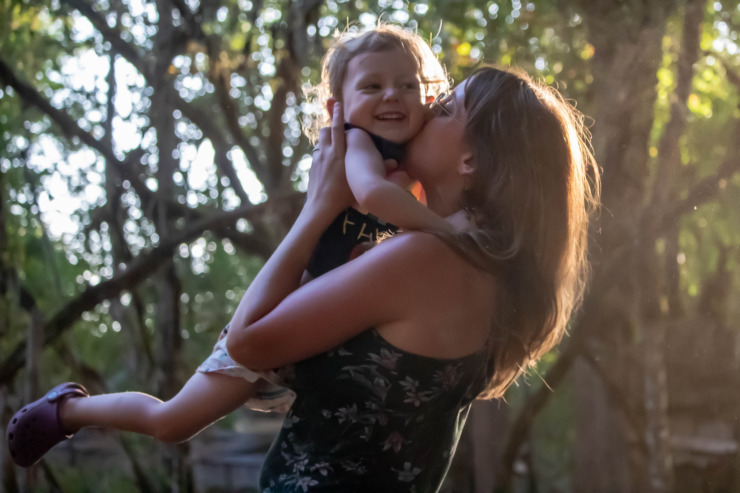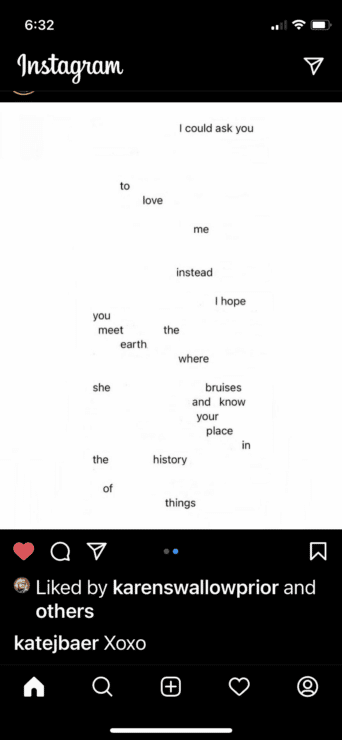Motherload
For more than a decade, I boycotted Mother’s Day. I started this the year my mother died and continued, each year finding a new reason to hide. When Marvel Studios used to release their summer blockbuster around that date, I’d refer to the second Sunday in May as Avenger’s Day, and a pink greeting card would not suffice. It turns out that what I needed was a poem acknowledging the truth of motherhood. I needed “Motherload” by Kate Baer.
Motherload
She keeps an office in her sternum, the flat
bone in the center of her chest with all its
urgent papers, vast appointments, lists of
minor things. In her vertebrae she holds more
carnal tasks: milk jugs, rotten plants, heavy-
bottomed toddlers in all their mortal rage.
She keeps frustration in her hallux, senseless
chatter, jealous fangs, the spikes of a dinosaur’s
tail. The belly is more complicated—all heartache
and ambition. Fires and tidal waves.
In her pelvis she holds her labors, long and
slippery. In her clavicle, silent things. (Money
and power. Safety and choice. Tiny banquets of shame.)
In her hands she carries their egos, small and
flimsy. In her mouth she holds their laughter,
gentle currents, a cosmos of everything.
–Kate Baer
Baer’s debut collection What Kind of Woman released this fall and is a bestseller. Yes, you read that right: Her poetry book is a bestseller, perhaps because she knows how to use Instagram. She not only posts her poems, but she also posts the negative comments she receives. Earlier this month she posted a comment from someone (name blacked out) who suggested she go offline, for her kids’ sake. She turned his comment into an erasure poem, a form uniquely suited for dealing with unwanted online meddling. Baer’s forthcoming book, I Hope This Finds You Well, will feature other erasure poems created from her critics’ comments.
Although “Motherload,” is not an erasure, the way it lists body parts makes them stand out. The poem highlights the sternum, vertebrae, hallux, belly, pelvis, clavicle, hands, and mouth. As you read the poem aloud, I encourage you place your hand on the part that is mentioned. It increases the poem’s physicality. It makes you understand, perhaps in a new way, how physical is the work of being a mother.
Because the load we mothers bear is great. It encompasses every bit of our bodies, literally from head to hallux. I can think of more than one emotionally charged conversation with one of my children in which I channeled my frustration into my big toes, flexing and extending them inside the safety of a shoe, where no one would see.
This is a poem that makes me feel seen, line by line.
When I smiled politely at the friend who shared her child’s perfect graduation photo, did she get a glimpse of my “jealous fangs”? My labors were indeed “slippery,” although I hesitate to admit that rather revealing fact. When I read the words “Tiny banquets of shame,” I instinctively throw back my shoulders and realize that rolling them forward will never conceal those forbidden feasts.
This poem makes me think of one of my favorite mothers, Kristin Lavransdatter. There are many times she is not a good mother, but she’s often too busy trying to be a good mother to notice her failures. As she ages, she remembers her own mother and begins to see her with new eyes as she muses:
Now she realized that her mother’s heart had been deeply etched with memories of her thoughts about the child from before [Kristin] was born and from all the years the child could not remember, memories of fears and hopes and dreams that children would never know had been dreamed on their behalf, before it was their own turn to fear and hope and dream in secret.”
It is Baer’s “cosmos of everything” that we mothers carry, every fear and dream and hope for our children that did come to pass as well as those that did not. Every doctor’s appointment and every school supply list. And to whom do the children turn when they need their “urgent papers”? This is indeed a heavy load.
Reading Baer’s poems reminds me that I am not the only one who carries it. All of our bellies are full of “heartache / and ambition. Fires and tidal waves.” Avengers, every one.
By Heart for June
For the next By Heart gathering, June 25, we’ll learn Li-Young Lee’s “From Blossoms.” It will be peach season where I live, so grab your favorite summer fruit and savor the sweetness along with us.
From Blossoms
From blossoms comes
this brown paper bag of peaches
we bought from the boy
at the bend in the road where we turned toward
signs painted Peaches.
From laden boughs, from hands,
from sweet fellowship in the bins,
comes nectar at the roadside, succulent
peaches we devour, dusty skin and all,
comes the familiar dust of summer, dust we eat.
O, to take what we love inside,
to carry within us an orchard, to eat
not only the skin, but the shade,
not only the sugar, but the days, to hold
the fruit in our hands, adore it, then bite into
the round jubilance of peach.
There are days we live
as if death were nowhere
in the background; from joy
to joy to joy, from wing to wing,
from blossom to blossom to
impossible blossom, to sweet impossible blossom.
–Li-Young Lee
Photo by David Geitgey Sierralupe, Creative Commons, via Flickr. Post by Megan Willome.
Browse more By Heart
I loved this book. As soon as I finished, I began reading it again.”
—David Lee Garrison, author of Playing Bach in the D. C. Metro
- Perspective: The Two, The Only: Calvin and Hobbes - December 16, 2022
- Children’s Book Club: A Very Haunted Christmas - December 9, 2022
- By Heart: ‘The night is darkening round me’ by Emily Brontë - December 2, 2022



Maureen says
‘From Blossoms’ is one of my favorite Li-Young Lee poems.
Bethany R. says
Same here, Maureen. It’s a beauty. I’m hoping to memorize at least part of it.
Megan Willome says
I’ve been saving this one of his for a while. Looking forward to June!
Bethany R. says
Much to chew on here, Megan.
“And to whom do the children turn when they need their ‘urgent papers’? This is indeed a heavy load. Reading Baer’s poems reminds me that I am not the only one who carries it. All of our bellies are full of ‘heartache / and ambition. Fires and tidal waves.’”
Thank you for that. And this.
“I can think of more than one emotionally charged conversation with one of my children in which I channeled my frustration into my big toes, flexing and extending them inside the safety of a shoe, where no one would see.”
Megan Willome says
The subject of motherhood is one that yields much chewy fruit.
Will Willingham says
Cosmos of everything indeed.
Is there a person alive who doesn’t have some sort of complication around mothers day? I don’t yet understand why we have not yet all been done with it.
Anyway. Much of beauty in this piece, Megan. I’m glad to have read it.
Megan Willome says
Thanks, Will. I think you’re right, that Avenger’s Day and its sibling holiday in June are complicated for a lot of people for a lot of reasons. It’s not all flowers and BBQ, you know?
Nichoel Saltekoff says
Lovely poetry! Also, this is a photo of my daughter and I ❤️
A good friend of mine took it.
Megan Willome says
Oh my stars! How glorious!